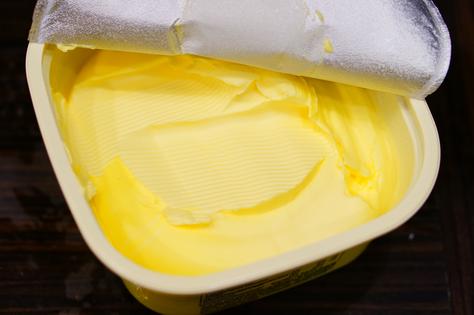Environmental Nutrition: Is margarine bad for you?
Are you wondering if margarine is a healthful choice? Simply put, margarine is a butter substitute made with vegetable oils that are emulsified with a liquid -- usually water or sometimes milk. Not so long ago, margarine received a bad rap because it often contained unfavorable amounts of saturated fats and trans fats from partially hydrogenated vegetable oils. Saturated fats and trans fats are fats we want to limit because of their link to increased cardiovascular disease risk. In recent years many manufacturers reformulated product recipes to eliminate partially hydrogenated oils and thus trans fats, but not necessarily saturated fats.
Not all margarines are created equal
There are many forms of margarine, including hard (sold in stick form and in tubs), soft, whipped, liquid and "spray." The form impacts the fat makeup. Stick margarine is higher in saturated fats in order to make the product solid at room temperature, like butter. In general, the softer the margarine the less saturated fat it contains. Sprays or liquid margarines have the least, if any, of this maligned fat. Note that manufacturers are permitted to claim "zero" saturated fats when the product contains less than 0.5 grams per serving, so look for sources of saturated fat, such as palm oil or palm kernel oil, in the ingredients list.
Comparing margarine to butter
Both regular butter and regular hard margarine clock in at approximately 100 calories and 11 grams (g) of total fat per serving (1 tablespoon). When it comes to saturated fat and cholesterol, a serving of hard margarine comes out ahead of butter, with zero cholesterol (butter has 30 milligrams) and 2 g of saturated fat versus 7 g in butter.
Even better margarines
One can find hard margarines as low as 60 calories and 7 g of total fat per serving. Softer and "light" margarines can be even lower in calories and total fat due to the incorporation of air (think "whipped" margarine) or water. Further, many margarines are fortified with vitamins, minerals and plant compounds (i.e., plant stanols to lower cholesterol), or special ingredients like flax and olive oil to improve their nutritional profile. The bottom line: In any form, margarine makes for a healthier choice over butter. But don't overdo it, as all types contain fat and calories.
(Environmental Nutrition is the award-winning independent newsletter written by nutrition experts dedicated to providing readers up-to-date, accurate information about health and nutrition in clear, concise English. For more information, visit www.environmentalnutrition.com.)











Comments